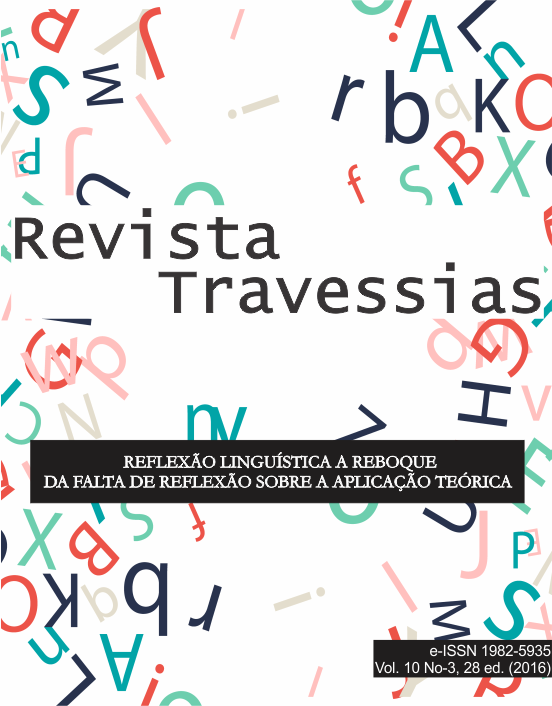Connection of the elementary 2nd grade didactic material with Provinha Brasil – Test of 2015
Keywords:
Didactic material. Literacy. Reading.Abstract
In this study we perform an analysis of didactic material, specifically, the Portuguese Language annual booklet – Reading, Interpreting and Learning – 2 nd grade, Elementary School, organized by the Municipal Secretariat of Education – SMED, in a city located in the Western Paraná. This didactic material, which was elaborated for Portuguese teaching focusing on reading, was used by teachers with 2nd grade classes during the year 2015. Considering the wide use in classrooms in the context of the research, it made us interested in taking this material as an object of study. Thus, it had the aim of pondering the reading conception in which the material was based and of analyzing whether the material encompasses texts and activities that aim the development and learning of the descriptors evaluated in Provinha Brasil – Test 2 of 2015. Provinha Brasil is an assessment instrument in large scale, created by MEC/INEP, in order to diagnose, in this level of schooling, what are the skills that the public schools students already master and which they still do not. This evaluation is applied twice a year: once at the beginning, when the students join the classes; and the other at the end of the year, when they are finishing the second grade. With this qualitative and interpretative research, whose approach is the documentary analysis, in the context of Applied Linguistics, we noticed that the leading of the activities proposed by the material analyzed is focused on texts. Thus, it encompasses just one of the skills expected and evaluated in Provinha Brasil, the D6 – ability to find explicit information on texts.
Downloads
References
AMOP. Associação dos Municípios do Oeste do Paraná. Currículo Básico para a Escola Pública Municipal: Educação Infantil e Ensino Fundamental – anos iniciais (2007) - 2ª Avaliação e Reorganização. Cascavel: AMOP, 2014.
BARBOSA, J. J. Alfabetização e leitura. 3. ed. São Paulo: Cortez, 2013.
BORTONI-RICARDO, S. M. O professor pesquisador: introdução à pesquisa qualitativa. São Paulo: Parábola, 2008.
BRASIL. Instituto Nacional de Estudos e Pesquisas Educacionais Anisio Teixeira – INEP. Provinha Brasil. Matriz de referência da avaliação. 2015. Disponível em: http://portal.inep.gov.br/web/provinha-brasil. Acesso em: 03 jan. 2016.
CEALE. Centro de alfabetização, leitura e escrita. Letra A: o Jornal do alfabetizador. Belo Horizonte, junho/julho de 2008 – Ano 4 – Edição especial. Disponível em: http://www.ceale.fae.ufmg.br. Acesso em: 02 jan. 2016.
COSTA-HÜBES, T. da C.; BARREIROS, R. C. Concepções e capacidades de leitura para o letramento. In: COSTA-HÜBES, T. da C. et al. (Orgs). Descritores da Prova Brasil (5º ano): estudos e preposições didáticas. São Carlos – SP: Pedro & João Editores, 2014.
COSTA-HÜBES, T. da C. concepção de leitura na sequência didática. In: Anais da 13ª JELL – Jornada de Estudos Linguísticos e Literários. Leitura e seus desdobramentos. Marechal Cândido Rondon, PR: EDUNIOESTE, 2010.
GERALDI, João W. (Org.). O texto na sala de aula. 4. ed. São Paulo: Ática, 2006.
GIL, A. C. Métodos e técnicas de pesquisa. 6. ed. São Paulo: Atlas, 2008.
KLEIMAN, A. Texto & leitor: Aspectos cognitivos da leitura. 14. ed. São Paulo: Pontes, 2011.
KLEIN, L. R. Alfabetização: quem tem medo de ensinar? 4. ed. São Paulo: Cortez; Mato Grosso do Sul: UFMS, 2002.
KOCH, I. V. O texto e a construção de sentidos. 10. ed. São Paulo: Contexto, 2012.
______; ELIAS, V. M. Ler e compreender os sentidos do texto. São Paulo: Contexto, 2012.
LAJOLO, M. Do mundo da leitura para a leitura do mundo. 6. ed. São Paulo: Ática, 2000.
LEFFA, V. J. Aspectos da leitura: Uma perspectiva psicolinguística. Porto Alegre: Sagra – D.C Luzzatto, 1996.
______. Perspectivas no estudo da leitura: texto, leitor interação social. In: LEFFA, V. J. PEREIRA, A. E. (Orgs.). Ensino de leitura e produção textual: alternativas de renovação. Pelotas: Educat, 1999. Disponível em: http://www.leffa.pro.br/. Acesso em: 18 jan. 2016.
MENEGASSI, R. J. Compreensão e interpretação no processo de leitura: noções básicas ao professor. Maringá: Revista Unimar, 1995.
______. Ensino da leitura. 2. ed. Formação de professores – EAD. Maringá: Eduem, 2010.
ROJO, R. Letramento e capacidades de leitura para a cidadania. 2004. São Paulo. Disponível em: <http://www.debragancapaulista.educacao.sp.gov.br>. Acesso em: 07 set. 2015.
SMED. Secretaria Municipal da Educação. Lendo, Interpretando e Aprendendo e Apostila de atividades do 2º ano – Língua portuguesa. Foz do Iguaçu, 2015. Disponível em:
https://ead.pti.org.br/ntm/. Acesso em: 10 jan. 2015.
SOLÉ, I. Estratégias de leitura. Tradução de Cláudia Schilling. 6. ed. Porto Alegre: Artmed, 1998.
Downloads
Published
How to Cite
Issue
Section
License
Creative Copyright Notice
Policy for Free Access Journals
Authors who publish in this journal agree to the following terms:
1. Authors keep the copyright and grant the journal the right of first publication, with the work simultaneously licensed under the Creative Commons Attribution License, which allows sharing the trial with acknowledgment of authorship and initial publication in this journal.
2. Authors are authorized to take additional contracts separately, for non-exclusive distribution of the work version, published in this journal (eg publish in institutional repository or as a book chapter), with acknowledgment of authorship and initial publication in this journal.
3. Authors are allowed and encouraged to publish and distribute their work online (eg in institutional repositories or on their personal page) at any point before or during the editorial process, as this can generate productive changes, as well as increase both impact and citation of the published trial (See The Effect of Free Access).
Creative Commons License
This work is licensed under a Creative Commons Attribution–NonCommercial-shareaswell 4.0 International License, which allows you to share, copy, distribute, display, reproduce, completely or part of the work, since there is no commercial purpose, and authors and source are cited.



